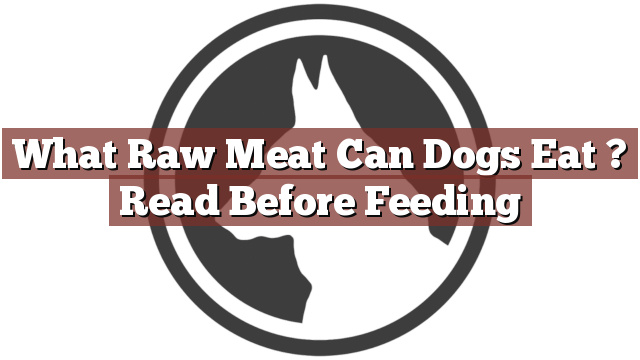Understanding Your Dog’s Dietary Needs
As a responsible dog owner, it is essential to understand your furry friend’s dietary needs. Dogs are primarily carnivorous animals, and their bodies are designed to digest and absorb nutrients from animal-based protein sources. While dogs can survive on a balanced diet of commercial dog food, many pet owners also opt to feed their dogs raw meat. However, it is crucial to know what types of raw meat are safe for dogs to consume.
What Raw Meat Can Dogs Eat? Read Before Feeding
Can dogs eat raw meat? The answer is yes, dogs can eat certain types of raw meat. However, it is important to be cautious about the specific raw meat you offer your beloved pet. Dogs can safely consume raw beef, chicken, turkey, lamb, and other types of lean meats. It is crucial to ensure that the raw meat is fresh and of high quality, as consuming spoiled or contaminated meat can lead to health problems for your dog.
On the other hand, there are certain types of raw meat that dogs should avoid. Raw pork, for example, can be harmful to dogs as it may contain a parasite called trichinella spiralis, which can cause trichinosis. Additionally, raw fish should be avoided due to the risk of parasites and bacteria, such as salmonella. It is always best to consult with your veterinarian to determine the safest and most nutritious raw meat options for your dog.
Pros and Cons of Feeding Raw Meat to Dogs
Feeding raw meat to dogs has both advantages and disadvantages. The pros include the fact that raw meat is a natural and biologically appropriate diet for canines, closely resembling what their ancestors consumed in the wild. It can provide essential nutrients, such as vitamins, minerals, and amino acids, in a highly digestible form. Some dog owners also claim that a raw meat diet can lead to a shinier coat, healthier skin, and improved overall health for their pets.
However, the cons of feeding raw meat to dogs should also be considered. One major concern is the potential for bacterial contamination. Raw meat can carry harmful bacteria like salmonella or E. coli, which can cause foodborne illnesses in both dogs and humans. Additionally, feeding a raw meat diet requires careful meal planning to ensure a balanced intake of nutrients, which can be challenging for some pet owners. It is important to evaluate the risks and benefits before deciding whether to incorporate raw meat into your dog’s diet.
Conclusion: Considerations for Feeding Raw Meat to Your Dog
In conclusion, feeding your dog raw meat can be a viable option if done correctly. When considering a raw meat diet for your furry friend, it is crucial to understand their dietary needs and consult with a veterinarian. Can dogs eat raw meat? Yes, they can, but it is essential to stick to safe options like raw beef, chicken, turkey, or lamb while avoiding raw pork and fish. Additionally, weighing the pros and cons of feeding raw meat is important, considering the potential for bacterial contamination and the need for proper nutrient balance. Ultimately, the decision to feed your dog raw meat should be based on your pet’s individual needs, preferences, and any specific health considerations.
Thank you for taking the time to read through our exploration of [page_title]. As every dog lover knows, our furry friends have unique dietary needs and responses, often varying from one canine to another. This is why it's paramount to approach any changes in their diet with caution and knowledge.
Before introducing any new treats or making alterations to your dog's diet based on our insights, it's crucial to consult with a veterinarian about [page_title]. Their expertise ensures that the choices you make are well-suited to your particular pet's health and well-being.
Even seemingly harmless foods can sometimes lead to allergic reactions or digestive issues, which is why monitoring your dog after introducing any new food item is essential.
The content provided here on [page_title] is crafted with care, thorough research, and a genuine love for dogs. Nevertheless, it serves as a general guideline and should not be considered a substitute for professional veterinary advice.
Always prioritize the expert insights of your veterinarian, and remember that the health and happiness of your furry companion come first.
May your journey with your pet continue to be filled with joy, love, and safe culinary adventures. Happy reading, and even happier snacking for your canine friend!

